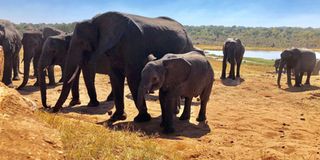Zimbabwe reopens parks, restaurants to save hospitality sector

Elephants appear at a watering hole near the Ivory Lodge Campsite, on the outskirts of Hwange National Park in Zimbabwe. PHOTO | FILE | ANDREA SACHS | WASHINGTON POST
What you need to know:
- The southern African country imposed a lockdown at the end of March to stop the spread of coronavirus.
- The hospitality sector is among the hardest hit by the restrictions.
Zimbabwe has reopened its national parks to the public and allowed restaurants to start serving food within their premises to rescue the country’s hospitality sector from possible collapse occasioned by Covid-19 restrictions.
The southern African country imposed a lockdown at the end of March to stop the spread of coronavirus with the hospitality sector being among the hardest hit by the restrictions.
Information Minister Monica Mutsvangwa said the move follows requests from industry stakeholders.
“In the tourism and hospitality sector, requests for variations of operating conditions in respect of restaurant operators and to reopen safari operators for local hunting only and national parks were granted,” Ms Mutsvangwa told journalists in Harare after a Cabinet meeting.
Lockdown regulations only allowed restaurants to stay open for their full licenced hours, but limited them to take-aways.
Zimbabwe's parks agency had said the lockdown dried up funding sources and it was now struggling to pay its rangers.
Anti-poaching activities had also been hit hard by the lack of funds, the agency said.
The relaxation of the regulations will, however, only allow for domestic tourism.
Tourism is one of Zimbabwe’s biggest foreign currency earners with over 2.5 million people visiting the country every year.
The government is slowly opening its economy despite a spike in new Covid-19 cases, which went up to 591 by Wednesday.
Seven people have died of the disease since the outbreak began.
The government says most of the cases are being reported from citizens returning from countries such as South Africa, Botswana and the United Kingdom.
Close to 10,000 citizens have returned from different countries since the outbreak began in March.
Thousands are being held at isolation centres across the country for a mandatory 21 days before they are allowed to re-join their families.





